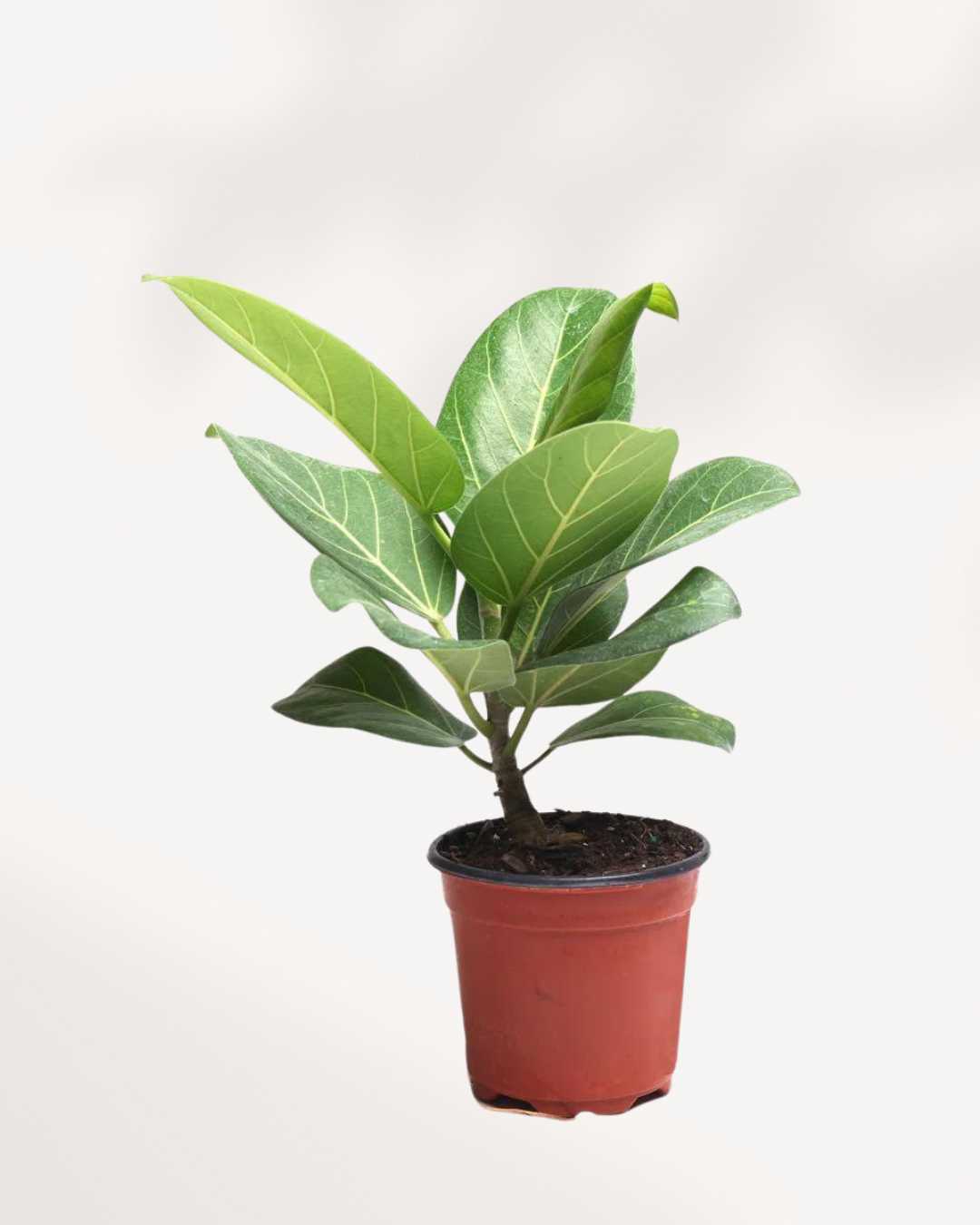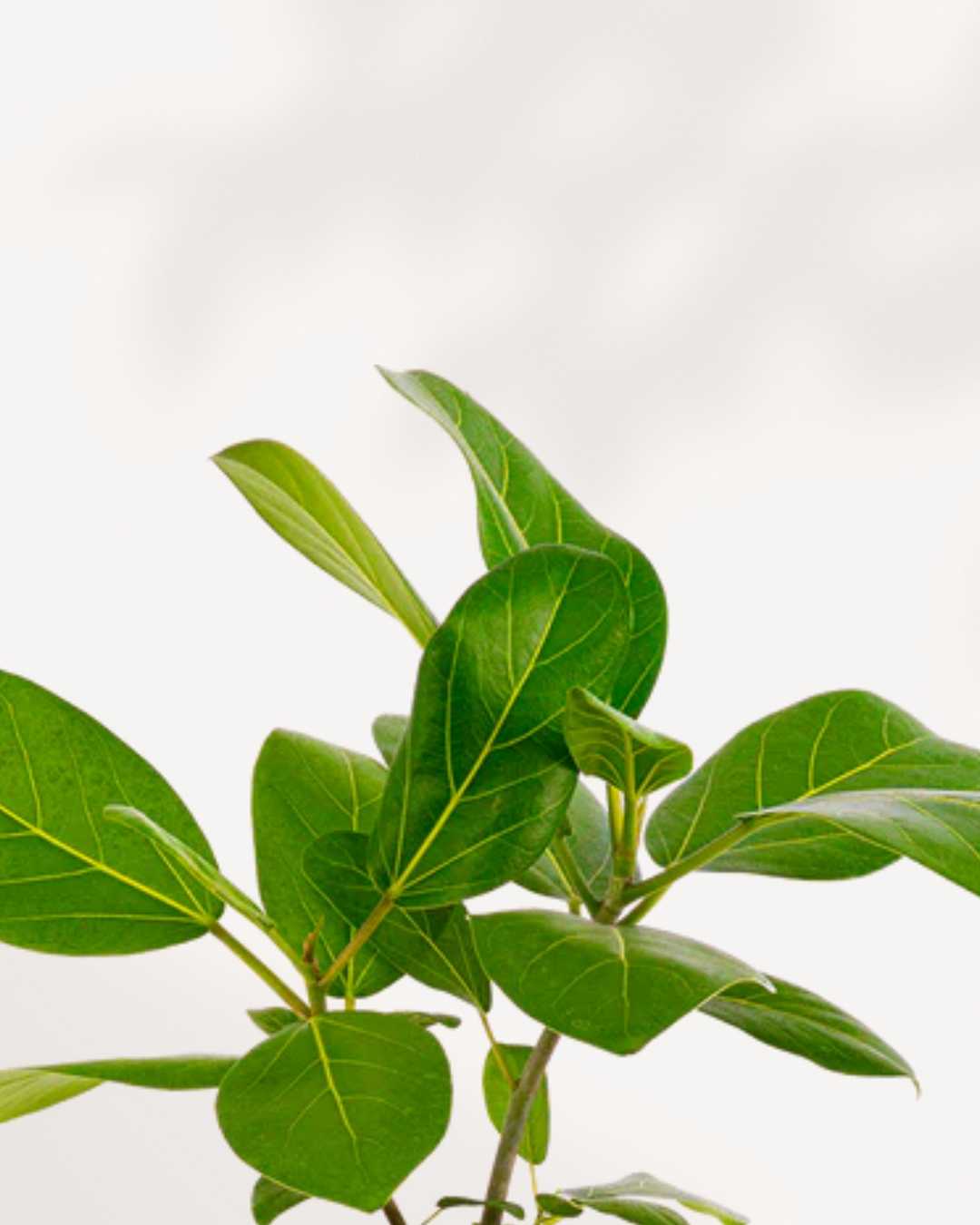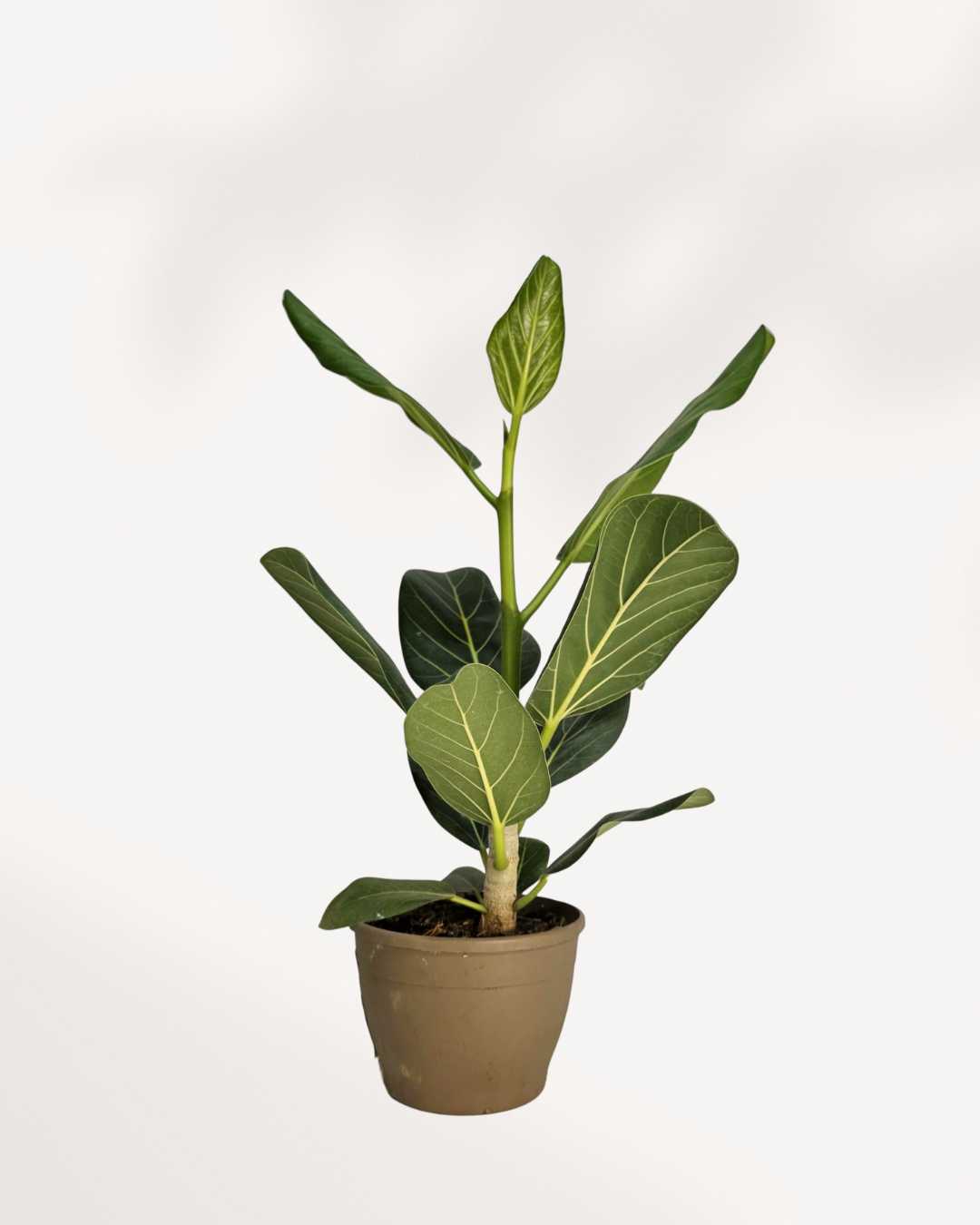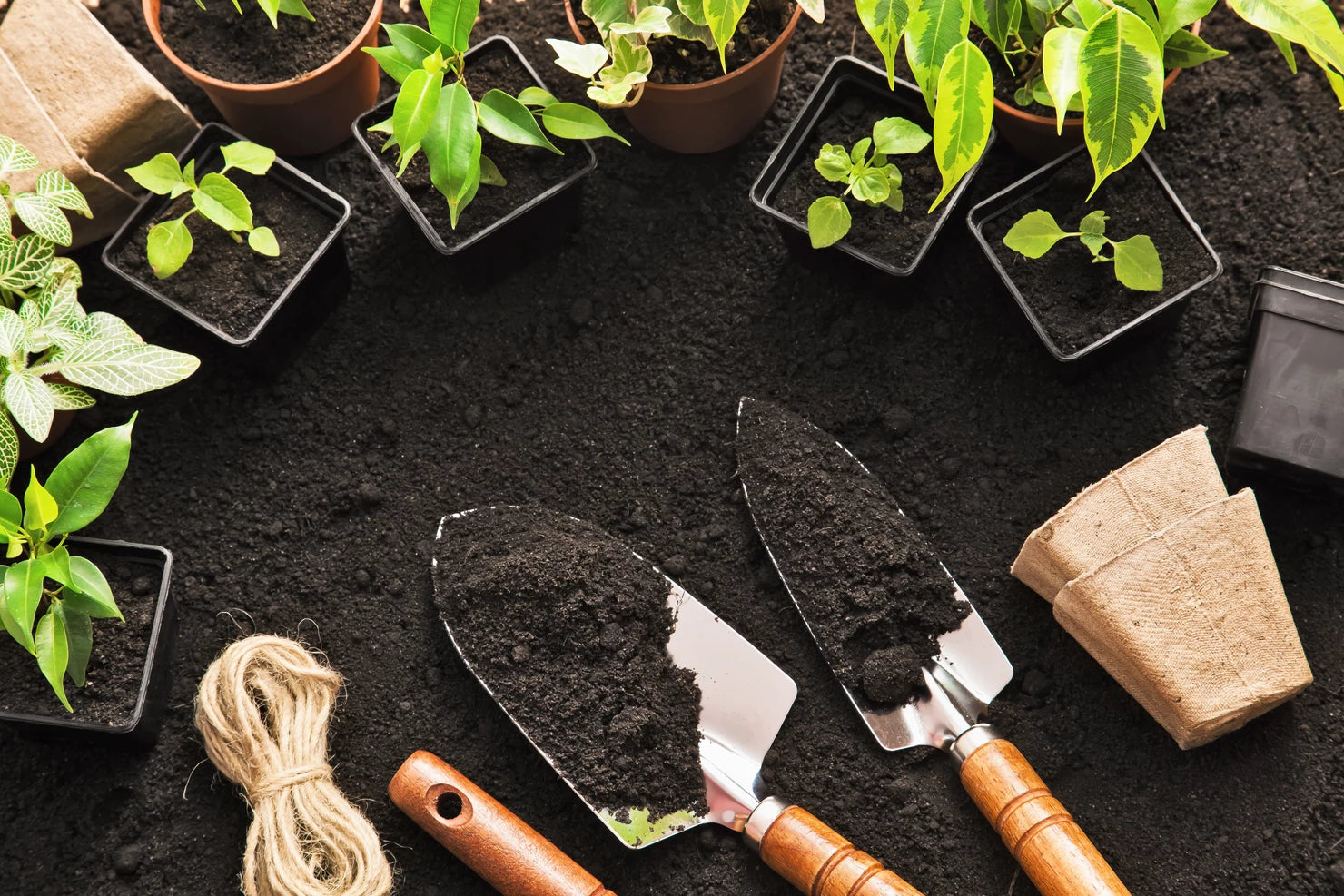Couldn't load pickup availability
Ficus Audrey: A Modern Twist on a Classic Ficus
Meet Ficus Audrey—a refined cultivar of the popular weeping fig (Ficus benjamina) known for its broad, lush leaves and graceful form. This elegant indoor plant is cherished for its ability to adapt to various light conditions and its low-maintenance care, making it a favorite among both seasoned plant enthusiasts and beginners.
Why You'll Love Ficus Audrey
- 🌿 Elegant, broad leaves with a rich, textured appearance
- 🏡 Ideal for indoor environments, adding a touch of sophistication
- 💧 Low-maintenance and adaptable to different light conditions
What’s in a Name?
- Ficus Audrey
- Audrey’s Ficus
- Ficus benjamina 'Audrey'
Meet the Family
- Kingdom: Plantae
- Order: Rosales
- Family: Moraceae
- Genus: Ficus
- Species: Ficus benjamina
Where It Comes From
The origins of Ficus Audrey trace back to the tropical and subtropical regions of Asia and Australia, where its ancestor, the weeping fig, thrives in warm, humid climates. Its adaptability to indoor conditions has made it a beloved addition to homes and offices worldwide.
A Touch of Elegance in Every Home
For decades, the weeping fig has been a symbol of natural beauty and serenity. Ficus Audrey enhances this legacy with its modern, refined look, making it a statement piece in contemporary interior design.
Why It’s So Popular
- Transforms any space with its stylish, lush foliage
- Helps purify indoor air and creates a calming atmosphere
- Easy to care for and adaptable to various light settings
What Does It Look Like?
Leaf Characteristics
Ficus Audrey showcases broad, glossy leaves with a deep, vibrant green color. The leaves have a subtly textured surface that gives them a fuller, more robust appearance compared to traditional weeping figs.
Growth Habit
This cultivar exhibits an upright growth pattern with well-spaced branches that create an airy, elegant structure. Its balanced form makes it a standout feature in any indoor setting.
Popular Ficus Plant Varieties
- Ficus Elastica 'Burgundy' – Known for its dark, glossy leaves and bold appearance.
- Ficus Shivereana 'Moonshine' – Features pale green, variegated leaves with a marbled texture.
- Ficus Triangularis Variegata – Unique triangular leaves with creamy-white variegation.
- Fiddle Leaf Fig – Iconic violin-shaped leaves perfect for modern interiors.
Dealing with Pests
Spider Mites
Increase humidity and treat with insecticidal soap. Learn More
Mealybugs
Remove them with rubbing alcohol or insecticidal soap. Learn More
Scale Insects
Gently scrape off the insects and apply horticultural oil. Learn More
Frequently Asked Questions
How much light does Ficus Audrey need?
Ficus Audrey thrives in bright, indirect light. While it can adapt to lower light levels, providing ample diffused sunlight encourages optimal growth and a healthier appearance.
How often should I water it?
Water your Ficus Audrey when the top inch of soil feels dry to the touch. Overwatering can lead to root rot, so it’s best to let the soil dry slightly between waterings.
Is it pet-friendly?
Ficus Audrey is generally considered non‑toxic to pets, but it’s always wise to keep plants out of reach of curious animals.
What temperature is ideal?
This plant does best in warm indoor environments, ideally between 65°F and 75°F (18°C‑24°C). Avoid exposing it to drafts or sudden temperature changes.
Learn More About Ficus Audrey Care
For detailed care instructions and tips to keep your Ficus Audrey thriving, check out our Ficus Care Guide.
Ready to Enhance Your Space with Ficus Audrey?
Add a touch of elegance and natural beauty to your home or office today.
Shop NowHow to take care of Ficus Audrey
Sun: Direct
Sun: Direct
Light: Bright
Light: Bright
Water: When mostly dry
Water: When mostly dry
Humidity: Any
Humidity: Any
Pet Friendly: Caution
Pet Friendly: Caution
Pro Tip
Pro Tip
Delivery Policy for Plant Condition
Delivery Policy for Plant Condition
"I have only received part of my order. What to do?
No worries if you've only got part of your order! Our plants come from different nurseries and might arrive in separate shipments, typically 1-2 days apart. It's all part of ensuring your green friends reach you in top-notch condition!
If you do not receive the remaining packages within 48 hours contact support at info@mygreenscape.ca
What is the Life Time Support?
Absolutely! Lifetime support means you can count on us whenever you have questions or uncertainties about your plant. Whether you're puzzled by its behavior or just want to ensure it's thriving, we're here for you. Connect with us on Instagram @mygreenscapeto or shoot us an email at support@mygreenscape.ca.
When it comes to our guarantee for plants shipped with standard or express, rest assured that we offer a 30-day happy healthy plant guarantee on all such shipments. This ensures that your plants are covered for 30 days after delivery, giving you peace of mind regarding their condition. If you have any concerns within this period, feel free to reach out to us for assistance.
For further details, please visit our Local Delivery, Store Pickup, Standard Shipping Guide Page.
What to expect
What to expect
Your plant will arrive in a standard nursery pot, typically 0.5" - 1" smaller than the stated size to seamlessly fit into your chosen decorative pot. Washable Paper Planter Bags are available for separate purchase.
Just like nature intended, each plant is unique, showcasing natural variations in size, shape, and characteristics. Our commitment is to deliver a plant that closely resembles the one featured on our website, matching your chosen size, and with the potential to thrive happily in your home.
Frequently Asked Questions
Frequently Asked Questions
Certainly! If you're pondering about ordering plants online, you're not alone. We've compiled the most frequently asked questions. Check out our FAQ section here for quick answers! Happy planting!
Plant & Pot Size Chart
Plant & Pot Size Chart
Choosing the right pot size for your plants can be a daunting task, especially if you're new to gardening. But fear not! Our pot sizes chart can help you find the perfect match for your plants, ensuring they have enough space to grow and thrive. With our guide, you'll be able to confidently choose the right pot size and plant variety for your gardening needs.
Plant Pot Size Guide.

| Extra Small | 7-10 cm | 2.5 - 3 inches |
| Small | 11-12 cm | 3.5 - 4 inches |
| Medium | 14-17 cm | 5 - 6 inches |
| Large | 19-21 cm | 8 - 10 inches |
| Extra Large | 24-27 cm | 12 - 14 inches |
All sizes are specified in product details.
Your Complete Guide to Pot Sizes: What Size Should You Choose?

When selecting a pot for your plant, it's important to find the right size. But with all the different options out there, how do you know which one is best? We're here to help!
MyGreenscape's pot sizes chart is a great resource for finding your perfect fit. Our easy-to-read chart takes out all the guesswork and helps you quickly choose the right size for your plant.
Smaller pots are best for seedlings or small plants just starting out. These tend to be shallow but wide, allowing enough room for the roots of the young plant but not too much where they get overcrowded. Medium-sized pots are ideal when your plant has grown from its infancy and is ready for more space. These are deeper and wider than small pots, so that it can accommodate larger root systems - making sure your plant gets enough nourishment while still giving it breathing room. Large pots are top choice if you have an established plant in need of lots of space - think trees and large shrubs! The spacious depth and width allow plenty of room for deep root systems without struggling for air or light.
No matter what size you choose, MyGreenscape has got you covered, with our pot sizes chart guaranteeing you find the perfect fit every time!
Winter Shipping Protection
Winter Shipping Protection
We take extra care with each package during the colder months. For destinations experiencing cold weather, we provide insulated packaging and heat packs as needed to protect your plants from freezing temperatures. With Winter Shipping Protection, your plants are equipped to arrive safe and sound, even in winter’s chill.
Care Guide
Care Guide
Explore essential care tips. check out our Comprehensive Resource for Indoor Plant Care.




WATERING MADE EASY
Check soil moisture before watering and use a potting mix that drains well. It’s the secret to healthy, happy plants!
Hear From Happy Plant Parents.
Who have brought Mygreenscape plants into their homes.


















